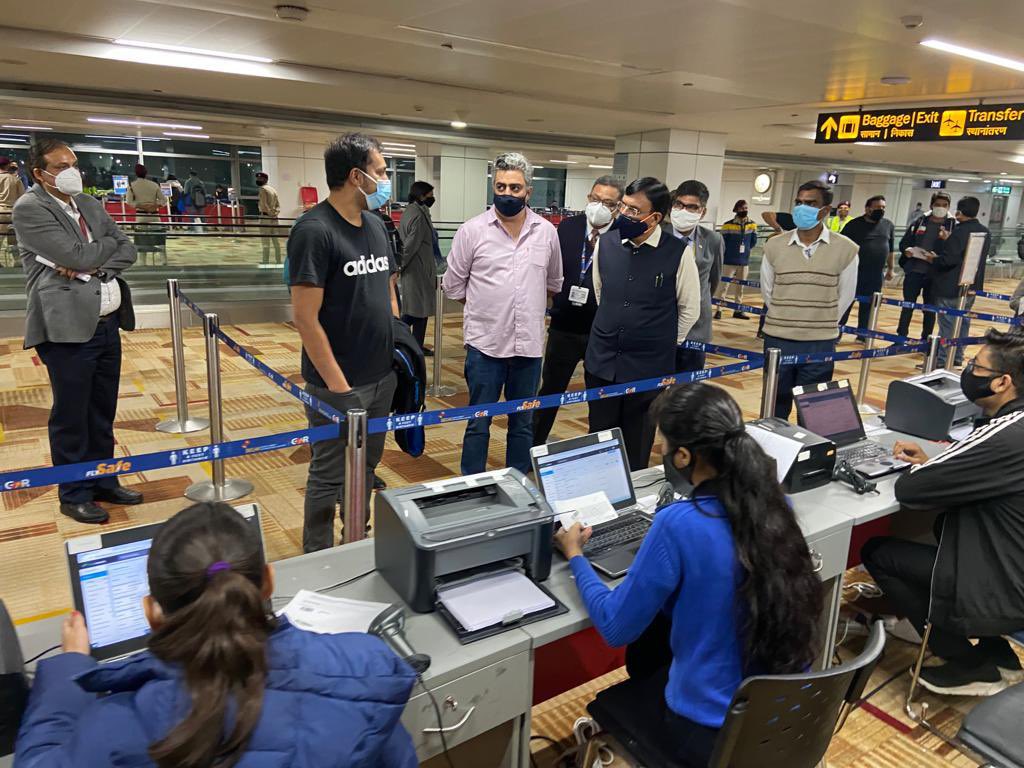As you may know that amid the fear of new Covid-19 variant Omicron an on arrival RT-PCR or Rapid PCR test is now mandatory for passengers arriving from ‘At Risk’ countries.
In view of this Delhi International Airport has now reduced the Rapid, RT-PCR testing and screening time to as low as just 30 minutes at its Terminal 3.
Union Health Minister Mansukh Mandaviya on Sunday reviewed RTPCR testing facilities for passengers coming from “at-risk” countries at Indira Gandhi International Airport. Currently, as many as 35 rapid RT-PCR testing machines are functional at the terminal to provide the facility.
The list of countries from where travellers would need to follow additional measures on arrival in India, including post-arrival testing include
- the United Kingdom
- South Africa
- Brazil
- Botswana
- China
- Mauritius
- New Zealand
- Zimbabwe
- Singapore
- Hong Kong and
- Israel
Later the minister took to Twitter to say, “Reviewed RT-PCR testing facilities for passengers coming from at-risk countries at the IGI airport, New Delhi. Thirty-five rapid RT-PCR testing machines are functional at Terminal 3.
“With this, screening and testing time of passengers can be reduced to even 30 minutes,” he added.
Reviewed RT-PCR testing facilities for passengers coming from at-risk countries at the IGI airport, New Delhi.
— Dr Mansukh Mandaviya (@mansukhmandviya) December 5, 2021
35 rapid RT-PCR testing machines are functional within the Terminal -3.
With this, passengers screening & testing time can be reduced to even 30 minutes. pic.twitter.com/1yd5CkI6gL
Delhi Report First Case of Omicron
Delhi on Sunday reported its first case of the Omicron COVID-19 variant. A 37-year-old man who arrived in Delhi from Tanzania has been found to be infected with Omicron. The patient complained of sore throat, weakness and body ache and is currently admitted at the Lok Nayak Hospital.
India’s Omicron tally reaches 21
Meanwhile, 21 cases of Omicron cases have been reported across the country. Out of these 21 cases, nine have been reported in Rajasthan, eight in Maharashtra, two in Karnataka and one each in Delhi and Gujarat.
On November 25, a new variant was reported to the World Health Organisation (WHO) from South Africa. As per the WHO, the first known confirmed B.1.1.529 infection was from a specimen collected on November 9 this year.
On November 26, the WHO named the new COVID-19 variant B.1.1.529 as ‘Omicron’. Later, it was classified as a ‘variant of concern’.
Following this, India has several countries on the list from where travellers would need to follow additional measures on arrival in the country.
India has also added several countries to the list from where travellers would need to follow additional measures on arrival in the country, including post-arrival testing for infection.
Follow and connect with us on Facebook, Twitter, LinkedIn, Instagram and Google News for the latest travel news and updates!
Also Read: DGCA Issues New Guidelines For International Passengers Arriving In India: Details Here





